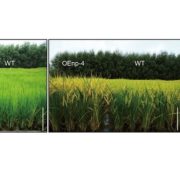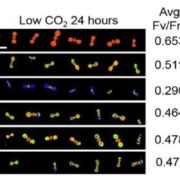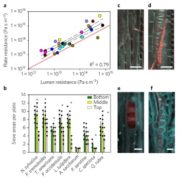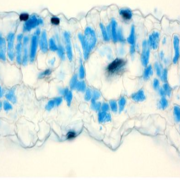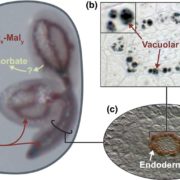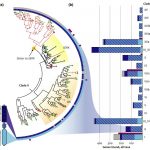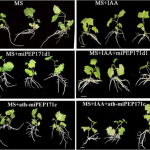Maize aquaporin PIP2;5 alters water relations and plant growth (Plant Physiol)
 Aquaporins, also known as water channels, are conserved across all kingdoms. In plants, the plasma membrane intrinsic protein (PIP) subfamily controls membrane water permeability. Maize aquaporin PIP2;5 is highly expressed in roots. By reverse genetic approaches, Ding et al. showed that overexpression (OE) and knock-out (KO) of PIP2;5 affect water relations and plant growth upon mild stress. PIP2;5 OE plants show higher hydraulic conductivity of the root cortex cells, with no change in whole root hydraulic conductivity. The quantitative MECHA hydraulic model suggests that the plasma membrane permeability of the cells is not radially uniform, and PIP2;5 could saturate in the endodermis and exodermis layers. Thus, increasing its expression level in the cortex cells has no measurable effect on the conductivity of the whole-root system. By contrast, under mild water stress the time course of leaf elongation rate is faster in the OE lines, where PIP2;5 levels are elevated in leaves relative to wildtype. In the KO lines, conductivity was decreased in the root, but unaffected in the leaves. These results indicate a possible beneficial role for PIP2;5 during stress. (Summary by Min May Wong @wongminmay) Plant Physiol. 10.1104/pp.19.01183
Aquaporins, also known as water channels, are conserved across all kingdoms. In plants, the plasma membrane intrinsic protein (PIP) subfamily controls membrane water permeability. Maize aquaporin PIP2;5 is highly expressed in roots. By reverse genetic approaches, Ding et al. showed that overexpression (OE) and knock-out (KO) of PIP2;5 affect water relations and plant growth upon mild stress. PIP2;5 OE plants show higher hydraulic conductivity of the root cortex cells, with no change in whole root hydraulic conductivity. The quantitative MECHA hydraulic model suggests that the plasma membrane permeability of the cells is not radially uniform, and PIP2;5 could saturate in the endodermis and exodermis layers. Thus, increasing its expression level in the cortex cells has no measurable effect on the conductivity of the whole-root system. By contrast, under mild water stress the time course of leaf elongation rate is faster in the OE lines, where PIP2;5 levels are elevated in leaves relative to wildtype. In the KO lines, conductivity was decreased in the root, but unaffected in the leaves. These results indicate a possible beneficial role for PIP2;5 during stress. (Summary by Min May Wong @wongminmay) Plant Physiol. 10.1104/pp.19.01183


